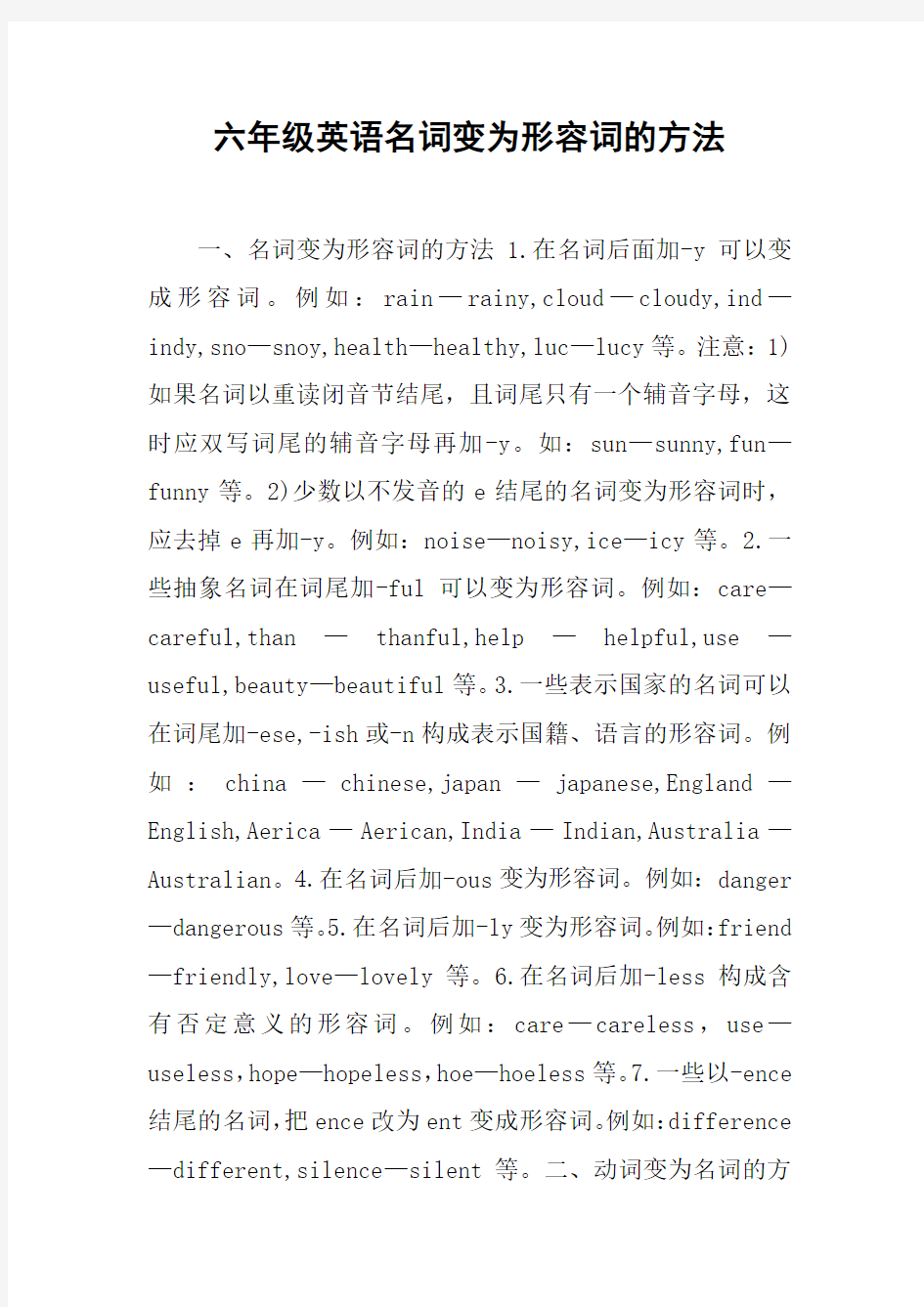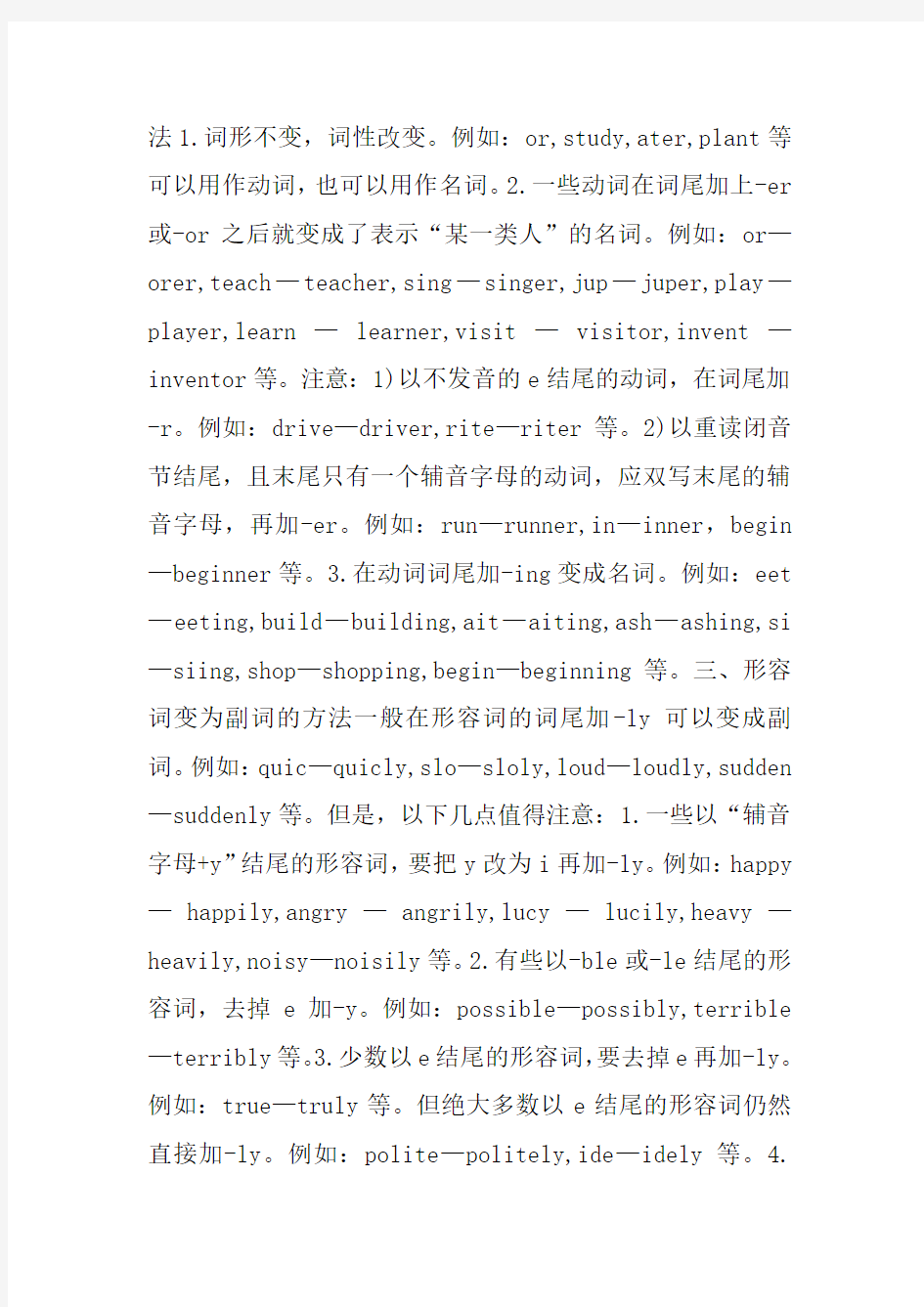六年级英语名词变为形容词的方法


六年级英语名词变为形容词的方法
一、名词变为形容词的方法1.在名词后面加-y可以变成形容词。例如:rain—rainy,cloud—cloudy,ind—indy,sno—snoy,health—healthy,luc—lucy等。注意:1)如果名词以重读闭音节结尾,且词尾只有一个辅音字母,这时应双写词尾的辅音字母再加-y。如:sun—sunny,fun—funny等。2)少数以不发音的e结尾的名词变为形容词时,应去掉e再加-y。例如:noise—noisy,ice—icy等。2.一些抽象名词在词尾加-ful可以变为形容词。例如:care—careful,than—thanful,help—helpful,use—useful,beauty—beautiful等。3.一些表示国家的名词可以在词尾加-ese,-ish或-n构成表示国籍、语言的形容词。例如:china—chinese,japan—japanese,England—English,Aerica—Aerican,India—Indian,Australia—Australian。4.在名词后加-ous变为形容词。例如:danger —dangerous等。5.在名词后加-ly变为形容词。例如:friend —friendly,love—lovely等。6.在名词后加-less构成含有否定意义的形容词。例如:care—careless,use—useless,hope—hopeless,hoe—hoeless等。7.一些以-ence 结尾的名词,把ence改为ent变成形容词。例如:difference —different,silence—silent等。二、动词变为名词的方
法1.词形不变,词性改变。例如:or,study,ater,plant等可以用作动词,也可以用作名词。2.一些动词在词尾加上-er 或-or之后就变成了表示“某一类人”的名词。例如:or—orer,teach—teacher,sing—singer,jup—juper,play—player,learn—learner,visit—visitor,invent—inventor等。注意:1)以不发音的e结尾的动词,在词尾加-r。例如:drive—driver,rite—riter等。2)以重读闭音节结尾,且末尾只有一个辅音字母的动词,应双写末尾的辅音字母,再加-er。例如:run—runner,in—inner,begin —beginner等。3.在动词词尾加-ing变成名词。例如:eet —eeting,build—building,ait—aiting,ash—ashing,si —siing,shop—shopping,begin—beginning等。三、形容词变为副词的方法一般在形容词的词尾加-ly可以变成副词。例如:quic—quicly,slo—sloly,loud—loudly,sudden —suddenly等。但是,以下几点值得注意:1.一些以“辅音字母+y”结尾的形容词,要把y改为i再加-ly。例如:happy —happily,angry—angrily,lucy—lucily,heavy—heavily,noisy—noisily等。2.有些以-ble或-le结尾的形容词,去掉e加-y。例如:possible—possibly,terrible —terribly等。3.少数以e结尾的形容词,要去掉e再加-ly。例如:true—truly等。但绝大多数以e结尾的形容词仍然直接加-ly。例如:polite—politely,ide—idely等。4.
以-l结尾的形容词变为副词时仍然要在词尾加-ly,而不是只加-y。除非是以-ll结尾的才在词尾只加-y。例如:usual —usually,careful—carefully,useful—usefully,full —fully等。
英语名词变为形容词有哪些规律
英语名词变为形容词有哪些规律。 英语名词变为形容词是如何学习英语中需要掌握的重要知识。 1、在名词后面加-y可以变成形容词(尤其是一些与天气有关的名词)。 例如:rain—rainy, cloud—cloudy, sun—sunny , fog—foggy ,wind—windy, snow —snowy, storm—stormy . hand—handy, blood—bloody, sand—sandy, fun—funny, push-pushy, rock—rocky, salt—salty, sleep—sleepy, health—healthy, luck—lucky等。注意:1)如果名词以重读闭音节结尾,且词尾只有一个辅音字母,这时应双写词尾的辅音字母再加-y。如:sun—sunny, fun—funny等。 2)少数以不发音的e结尾的名词变为形容词时,应去掉e再加-y。例如:noise—noisy, ice—icy 等。当然,自如何学习英语中,名词变为形容词不仅只有这种方法,还有别的方式如: 2、一些抽象名词在词尾加-ful可以变为形容词。例如:care—careful, thank—thankful, help—helpful, use—useful, beauty—beautiful等。 3、一些表示国家的名词可以在词尾加-ese, -ish或-n构成表示国籍、语言的形容词。例如:China—Chinese, Japan—Japanese, England—English, America—American, India—Indian, Australia —Australian(注意Canada—Canadian)。 4、在名词后加-ous变为形容词。例如:danger—dangerous等。 5、在名词后加-ly变为形容词。例如:friend—friendly, love—lovely等。 6、在名词后加-less构成含有否定意义的形容词。例如:care—careless(粗心的),less(无用的),hope—hopeless(没希望的),home—homeless(无家可归的)等。 7、一些以-ence结尾的名词,把ence改为ent变成形容词。例如:importance—important, difference—different, silence—silent等。
小学六年级英语形容词比较级练习题.docx
小学六年级英语形容词比较级练习题 班级 ___________姓名___________学号____________成绩________ the answers.(根据题意,写出答案。)(10分) black dog is _____ (thin) than the white dog. balloon is _____ (big) than yours. bag is _____ (heavy) than yours. is _____ (strong) than Mike. 5. I am _____ (short) than Lucy. II.用所给词的正确形式填空,每词用一次。( 10 分) Young long tall heavy old thin ’ s tail is than the rabbit ’s tail. is 11 years old. Nina is 12 years old. Dick is than Nina. ’ m 140 cm. ’ m 40 kg. You’re 42 kg. I’m than you. are you I’ m 45 kg. III.选择填空。(24 分) heavy are you __________. A. I ’ m 48 years old. B. I’ m 48 kg. C. I ’ m 48 cm. is 120 cm. Jack is __________. Than him. A. tall B. taller C. heavier 3. How heavy is the whale __________. A. It’s strong. B. It’s heavier. C. It’s 3600 kg. 4.How __________ are you A. old B. older C. taller 5.The monkey has a __________ tail.
英语名词转换为形容词
英语名词转化为形容词 一、在名词后面加-y可以变成形容词(特别是一些与天气有关的名词) 例如:rain—rainy,cloud—cloudy,wind—windy,snow—snowy, health—healthy,luck—lucky,anger—angry guilt—guilty(内疚的) tourist—touristy(游客多的) ,salt (盐)—salty (咸的) silk(丝绸)—silky(丝绸般的),sleep—sleepy (昏昏欲睡的) 注意:1)如果以重读闭音节结尾,且词尾只有一个辅音字母,这时应双写辅音字母再加“-y”。 如:sun—sunny,fun—funny,fog—foggy(有雾的),fur—furry(毛皮的) 2)少数以不发音的e结尾的名词变为形容词时,应去掉e再加“-y”。 如:noise—noisy,ice—icy,shine—shiny(发亮的),taste(口味)—tasty(甜的) 二、名词后面加-ed,以e结尾的直接加d。 例如:spot(斑点)—spotted(有斑点的); talent—talented (有天赋的) organize—organized 有组织的; balance—balanced(平衡的) 三、一些抽象名词在词尾加-ful可以变为形容词 例如:care—careful,thank—thankful,help—helpful, use—useful,meaning—meaningful 四、在名词后加-less构成含有否定意义的形容词 例如:care—careless(粗心的),use—useless(无用的) hope—hopeless(没希望的),home—homeless(无家可归的) 五、一些以-ce结尾的名词,把-ce改为-t变成形容词 例如:difference—different,silence—silent,confidence—confident 六、在名词后加-ly变为形容词
名词变形容词
名词变形容词: 1.名词后加-y, 如: luck→lucky cloud→cloudy wind→windy rain→rainy; sun→sunny snow→snowy noise-noisy health→healthy 2.在名词后加-ly, 如: friend→friendly love→lovely day→daily 3.方位名词加-ern,如: east→eastern west→western south→southern north→nor thern 二、形容词变副词 1、在形容词词尾直接加-ly。 如:real-really helpful-helpfully careful-carefully; hopeful-hopefully slow-slowly quick-quickly quiet-quietly 2、以辅音字母加y结尾的形容词要变y为i,然后再加-ly。 如:busy-busily angry-angrily easy-easily 3、某些以辅音字母加不发音的字母e结尾和以-ue结尾的形容词要先去掉e,然后再加-y或-ly。 如:terrible-terribly true-truly gentle-gently 注意:形容词的标记是adj,副词是adv。 三、用法 1.一般情况下,形容词在句中可作定语、表语和补语。 She has a new bike. It looks nice.她有一辆新的自行车。它看起来很不错。 (new作定语修饰名词bike,而nice在系动词的后面作为表语。) We’ll try our best to make our country beautiful.我们将尽力使我们的祖国美丽。
小学英语常见形容词及比较级、最高级变化一览表
小学英语常见形容词及比较级、最高级变化一览表 1.在形容词词尾加上“er”“est”构成比较级、最高级: bright(明亮的)—brighter—brightest young(年轻的)—younger—youngest cheap(便宜的)—cheaper—cheapest clean(干净的)—cleaner—cleanest clever(聪明的)—cleverer—cleverest cold(寒冷的)—colder—coldest cool(凉的)—cooler—coolest dark(黑暗的)—darker—darkest deep(深的)—deeper—deepest warm(温暖的)—warmer—warmest fast(迅速的)—faster—fastest few(少的)—fewer—fewest great(伟大的)—greater—greatest hard(困难的,硬的)—harder—hardest high(高的)—higher—highest kind(善良的)—kinder—kindest light(轻的)—lighter—lightest long(长的)—longer—longest loud(响亮的)—louder—loudest low(低的)—lower—lowest near(近的)—nearer—nearest new(新的)—newer—newest poor(穷的)—poorer—poorest quick(快的)—quicker—quickest quiet(安静的)—quieter—quietest rich(富裕的)—richer—richest short(短的)—shorter—shortest slow(慢的)—slower—slowest small(小的)—smaller—smallest smart(聪明的)—smarter—smartest strong(强壮的)—stronger—strongest weak(弱的)—weaker—weakest sweet(甜的)—sweeter—sweetest tall(高的)-taller-tallest thick(厚的)—thicker—thickest 2.双写最后一个字母,再加上“er”“est”构成比较级、最高级: big(大的)—bigger—biggest fat(胖的)—fatter—fattest hot(热的)—hotter—hottest wet(湿的)—wetter—wettest thin(瘦的)—thinner—thinnest 3.以不发音的字母e结尾的形容词,加上“r”“st”构成比较级、最高级: close(接近的)—closer—closest fine(好的,完美的)—finer—finest large(巨大的)—larger—largest late(迟的)—later—latest nice(好的)—nicer—nicest safe(安全的)—safer—safest strange(奇怪的)—stranger—strangest wide(宽广的)—wider—widest 4.以字母y结尾的形容词,把y改为i,再加上“er”“est”构成比较级、最高级:busy(忙碌的)—busier—busiest dirty(脏的)—dirtier—dirtiest dry(干燥的)—drier—driest early(早的)—earlier—earliest easy(容易的)—easier—easiest friendly(友好的)—friendlier—friendliest funny(好玩的)—funnier—funniest happy(开心的)—happier—happiest healthy(健康的)—healthier—healthiest heavy(重的)—heavier—heaviest
小学六年级英语形容词比较级练习题
小学六年级英语形容词比较级练习题班级___________ 姓名___________ 学号____________ 成绩________ I.Write the answers.(根据题意,写出答案。)(10分) 1.The black dog is _____ (thin) than the white dog. 2.This balloon is _____ (big) than yours. 3.My bag is _____ (heavy) than yours. 4.John is _____ (strong) than Mike. 5. I am _____ (short) than Lucy. II.用所给词的正确形式填空,每词用一次。(10分) Young long tall heavy old thin 1.Monkey’s tail is than the rabbit’s tail. 2.Dick is 11 years old. Nina is 12 years old. Dick is than Nina. 3.I’m 140 cm . 4.I’m 40 kg. You’re 42 kg. I’m than you. 5.How are you? I’m 45 kg. III.选择填空。(24分) 1.How heavy are you? __________. A. I’m 48 years old. B. I’m 48 kg. C. I’m 48 cm. 2.Tom is 120 cm. Jack is __________. Than him. A. tall B. taller C. heavier 3. How heavy is the whale? __________. A. It’s strong. B. It’s heavier. C. It’s 3600 kg. 4. How __________ are you? A. old B. older C. taller 5. The monkey has a __________ tail. A. tall B. long C. longer 6. How big are your feet? _________ . A. I wear Size 17. B. I’m bigger than you. C. I’m 17 bigger. 7. Jim is 40 kg. Tom is 38 kg. Tom is ________ than Jim. A. taller B. thinner C. heavier 8. I’m 11 years old. My sister is 2 years older than me. She is ________. A.11 B.12 C.13 9. I am ________ than my aunt. A. strong B. big C. shorter 10. My father is ________ than my grandpa. A. older B. younger C. smaller 11.My arms are 87 cm ____________. A. long B. tall C. old 12.His little brother is 3 kg ___________ than me. A.older B. shorter C. heavier IV.选出形容词的比较级形式。(28分)
名词动词形容词变化规则
1、可数名词如何变“复数形式”: a.一般情况下,直接加-s,如:book-books, bag-bags, cat-cats, bed-beds ;读音:清辅音后读[s],浊辅音和元音后读[z]。 b.以s. x. sh. ch结尾,加-es,如:bus-buses, box-boxes, brush-brushes, watch-watches ;读音:[iz]。c.以“辅音字母+y”结尾,变y为i, 再加-es,如:family-families, strawberry-strawberries ;读音:[z]。d.以“f或fe”结尾,变f或fe为v, 再加-es,如:knife-knives ,thief-thieves;读音:[z]。 e.以“o”结尾的词,分两种情况 1)有生命的+es 读音:[z]如:mango-mangoes tomato-tomatoes hero-heroes 2) 无生命的+s 读音:[z]如:photo-photos radio-radios f. 不规则名词复数:man-men, woman-women, policeman-policemen, policewoman-policewomen, snowman-snowmen, mouse-mice, child-children, foot-feet, tooth-teeth, fish-fish, people-people, Chinese-Chinese, Japanese-Japanese 1、写出下列各词的复数。 I _________ him _________ this _______ her ______ watch _______ mango_______child _______ photo ________ diary ______ day________ foot________ dress ________ tooth_______ sheep ______ box_______ strawberry _____ thief _______ engineer______ peach______ sandwich ______ man______ woman_______ leaf_______ people________ 单数复数 人称代词主格I you he she it we you they 宾格me you him her it us you them 物主代词形容词性my your his her its our your their 名词性mine yours his hers its ours yours theirs I(宾格)_______ she(形容词性物主代词)_______ we(名词性物主代词)_______ he(复数)_______ us(单数)_______ theirs(主格)_______ its(宾格)_______ 2、想一想,把下表补充完整。 人称代词物主代词 单数复数单数复数 主格宾格主格宾格形容词性名词性形容词性名词性第一人称me us our 第二人称you you 第三人称he them his their her it its 2、形容词、副词比较级的规则变化如下: (1)一般直接+er。如:tall - taller, fast - faster 单音节词如果以-e结尾,只加-r。如:late - later (2)重读闭音节词如末尾只有一个辅音字母,须双写这个字母,再加-er。如:big - bigger, fat - fatter (3)以辅音字母加-y结尾的词,变y为i,再加-er。如:heavy - heavier, early - earlier (4)双音节和多音节词的比较级应在原级前加more构成。如:beautiful - more beautiful, careful - more careful, quietly - more quietly, interesting - more interesting (5)有些不规则变化的,须逐一加以记忆。如:good/well – better, bad/ill – worse, many/much – more, far –farther/further, old –older/elder… 练一练:
小学英语里有哪几种词性
小学英语里有哪几种词性? 小学英语里有哪几种词性?比如:名词,动词,形容词 一、名词:名词是表示人、动物、物品以及抽象概念的词。 (1)专有名词:表示特定的人或食物名称的词叫做专有名词。 (2)可数名词:可以用数字一个一个数出来的名词,叫做可数名词。 (3)不可数名词:不可以用数字一个一个数出来的名词,叫做不可数名词。 二、冠词:冠词是用在名词前面,说明名词所表示的人或事物的词。 (英语中的冠词一共有三个:a、an、the,其中a和an是不定冠词,the是定冠词) 三、代词:代词就是代替名词以及起名词作用的短语、分句和句子的词。 代词表: 我:I(主格)me(宾格)my(形容词性物主代词)mine(名词性物主代词)myself (反身代词)my own(反身物主代词) 你:you(主格、宾格)your(形容词性物主代词)yours(名词性物主代词)yourself (反身代词)your own(反身物主代词) 他:he(主格)him(宾格)his(形容词性物主代词、名词性物主代词)himself (反身代词)his own(反身物主代词)
她:she(主格)her(宾格、形容词性物主代词)hers(名词性物主代词)herself (反身代词)her own(反身物主代词) 它:it(主格、宾格)its(形容词性物主代词、名词性物主代词)itself(反身代词)its own(反身物主代词) 我们:we(主格)us(宾格)our(形容词性物主代词)ours(名词性物主代词)ourselves(反身代词)our own(反身物主代词) 你们:you(主格、宾格)your(形容词性物主代词)yours(名词性物主代词)yourselves(反身代词)your own(反身物主代词) 他们(她们、它们):they(主格)them(宾格)their(形容词性物主代词)theirs(名词性物主代词)themselves(反身代词)their own(反身物主代词) 四、形容词:形容词是用来修饰或描述名词(或代词),表示人或事物的性质、状态和特征的词。 五、副词:副词是用来修饰动词、形容词、其它副词或全句的词,表示时间、地点、程度、方式等。 六、数词:数词是表示数目多少或顺序先后的词。数词分为基数词和序数词。(1)基数词:表示数目多少的数词叫做基数词。 (2)序数词:表示顺序的数词叫做序数词。
名词变形容词的十大规律
r s o 名词变形容词的十大规律 英语中,有时在名词之前或末尾加上不同的前缀或后缀就可以变为形容词。 如: sleep (睡觉) →asleep (睡着的) →sleepy (瞌睡的) help (帮助)→helpful (有帮助的) 下面将名词变为形容词的构成方法归纳如下: 一、 名词加“-y”构成形容词。如: rain (雨水) →rainy (多雨的) wind (风) →windy (多风的,风大的) cloud (云) →cloudy (多云的,阴天的) snow (雪)→ snowy (多雪的) sun (太阳)→ sunny (多阳光的,明朗的) [特别提醒:别忘了双写n] 以一个辅音字母结尾的重读闭音节结尾,须双写最后一个辅音字母。 luck (运气)→ lucky (幸运的) noise (嘈杂声) →noisy (嘈杂的,喧闹的) [特别提醒:别忘了去掉e]
以不发音的“e”结尾,须去掉“e”。 health (健康)→healthy(健康的) 二、名词加"-ful"构成形容词,表示肯定。如: use (使用)→useful(有用的) help (帮助)→helpful(有帮助的) harm (伤害,损害)→harmful(有害的) forget (忘记)→forgetful(健忘的) beauty (美丽)→beautiful(美丽的) [特别提醒:别忘了把-y变成-i,再加-ful] 辅音字母加“y”结尾,先改“y”为“i”。 care (关心,小心)→careful(小心的,仔细的)pain (疼痛)→painful(疼痛的) wonder (惊奇,想知道)→wonderful(极好的)color (颜色)→colorful(彩色的;色彩艳丽的)thank (感谢)→thankful(感激的,欣赏的)
(完整版)小学英语单词形容词总汇(最新整理)
PEP小学英语单词形容词总汇 PEP英语三年级(上册)三会单词 Unit3 red 红色的yellow 黄色的green 绿色的blue 蓝色的purple 紫色的white 白色的black 黑色的orange 橙色的pink 粉色的brown 棕色的 PEP英语三年级(下册)三会单词 Unit 2 great 太好了really 真地;确切地 Unit 6 small 小的big 大的long 长的short 短的;矮的tall 高的 PEP四年级下册四会单词词汇表 Unit 3 red(红色的) blue(蓝色的) yellow(黄色的) green(绿色的) white(白色的) Unit 4 warm(暖和的) cold(寒冷的) cool(凉爽的) snowy(下雪的) sunny(晴朗的) Unit 5 big(大的) small(小的) long(长的) short(短的) PEP五年级上册四会单词词汇表 Unit 1 Young (年轻的)funny (滑稽可笑的)tall (高的) strong (强壮的)kind (和蔼的;亲切的)old (年老的) short (矮的)thin (瘦的)strict (严格的)smart (聪明的;巧妙的)active (积极的;活跃的)quiet (安静的;文静的) Unit 3 tasty (好吃的)sweet (甜的)sour (酸的)fresh (新鲜的)salty (咸的)favourite (最喜爱的;特别喜爱的) Unit 5 in (在…里面)on (在…上面)under (在…下面) near (在..旁边)behind (在…后边) Unit 6 clean (干净的) PEP六年级下册四会单词词汇表
名词转化为形容词
英语词性转换:名词转化为形容词1名词+y Anger生气-----angry hunger---hungry fog—foggy有雾的 fur----furry毛皮的 guilt罪恶---guilty抱愧的 health---healthy luck---lucky cloud---cloudy wind—windy rain---rainy snow---snowy sun—sunny tourist------touristy游客多的 business---busy salt盐--- salty咸的 shine---shiny发亮的 silk丝绸—silky丝绸般的 sleep---sleepy昏昏欲睡的 taste口味,品味------tasty甜的
2.名词+ ed balance–balanced平均的 spot斑点,地点----spotted有斑点的talent-----talented有天赋的organized有组织的 disgusted厌恶的 offended生气的 crowded拥挤的 polluted被污染的 pleased高兴的 3.名词+ ful/less meaning—meaningful有意义的care—careful/ careless小心的;大意的help---helpful / helpless home—homeless无家可归的 colour---colourful pain疼痛---painful痛苦的 use---useless/ useful thank—thankful填塞感激的 peace和平---- peaceful清静的,宁静的playful顽劣的,爱玩耍的
名词变形容词
在名词后面加-y可以变成形容词(尤其是一些与天气有关的名词)。 例如:rain—rainy, cloud—cloudy, sun—sunny , fog—foggy ,wind—windy, snow—snowy, storm—stormy 除天气外还有hand—handy, blood—bloody, sand— sandy, fun—funny, push-pushy, rock—rocky, salt—salty, sleep—sleepy, health—healthy, luck—lucky 等。 注意: 1)如果名词以重读闭音节结尾,且词尾只有一个辅音字母,这时应双写词尾的辅音字母再加-y 。如:sun—sunny, fun—funny等。 2)少数以不发音的e结尾的名词变为形容词时,应去掉e再加-y。 例如:noise—noisy, ice—icy 等。 当然,自如何学习英语中,名词变为形容词不仅只有这种方法,还有别的方式如: 1. 一些抽象名词在词尾加-ful可以变为形容词。 例如: care—careful, thank—thankful, help—helpful, use —useful, beauty—beautiful等。 2. 一些表示国家的名词可以在词尾加-ese, -ish或-n构成表示国籍、语言的形容词。 例如:China—Chinese, Japan—Japanese, England—English, America—American, India— Indian, Australia —Australian(注意Canada—Canadian)。 3.在名词后加-ous变为形容词。例如:danger—dangerous 等。 4. 在名词后加-ly变为形容词。例如:friend—friendly, love—lovely等。 5.在名词后加-less构成含有否定意义的形容词。例如:care—careless(粗心的),use—useless(无用的),hope—hopeless(没希望的),home—homeless(无家可归的)等。
小学英语常见形容词及比较级
小学英语形容词比较级顺口溜 比较级是形容词,一好一坏要记牢, good更好是better, bad更坏是worse 结尾有e只加r,nice加r 变nicer; 双写目前有5个,bigger, fatter ,hotter,sadder和thinner 其余全部加er。 小学英语常见形容词及比较级变化一览表 1.在形容词词尾加上“er” “构成比较级: cheap(便宜的)—cheaper clean(干净的)—cleaner clever(聪明的)—cleverer cold(寒冷的)—colder cool(凉的)—cooler dark(黑暗的)—darker fast(迅速的)—faster great(伟大的)—greater hard(困难的,硬的)—harder low(低的)—lower high(高的)—higher kind(善良的)—kinder light(轻的)—lighter long(长的)—longer near(近的)—nearer new(新的)—newer quiet(安静的)—quieter rich(富裕的)—richer short(短的)—shorter slow(慢的)— slower small(小的)—smaller smart(聪明的)—smarter strong(强壮的)—stronger sweet(甜的)—sweeter tall(高的)-taller young(年轻的)—younger 2.双写最后一个字母,再加上“er”构成比较级: big(大的)—bigger fat(胖的)—fatter hot(热的)—hotter sad(伤心的)—sadder thin(瘦的)—thinner
英语名词变为形容词有哪些规律
. . 英语名词变为形容词有哪些规律。英语名词变为形容词是如何学习英语中 需要掌握的重要知识。在课堂上我讲了healthy是health加上y由名词变为形容词。在九班上课后,学生项丽铭与应慧慧举手问我有关还有哪些名词也是如此呢?在九班是班上英语最好的几个学生都坐在那几排,而且,她们也是提问最多的学生,因为她们有所思考,这也是我所最为欣赏的,只有思考的学生才能不断地进步。于是我便留下为她们讲解一些。参见:20种记忆英语单词的方法 在名词后面加-y可以变成形容词(尤其是一些与天气有关的名词)。例如:rain—rainy, cloud—cloudy, sun—sunny , fog—foggy ,wind—windy, snow—snowy, storm —stormy . 除天气外还有hand—handy, blood—bloody, sand—sandy, fun—funny, push-pushy, rock —rocky, salt—salty, sleep—sleepy, health—healthy, luck—lucky等。 注意:1)如果名词以重读闭音节结尾,且词尾只有一个辅音字母,这时应双写词尾的辅音字母再加-y。如:sun—sunny, fun—funny等。 2)少数以不发音的e结尾的名词变为形容词时,应去掉e再加-y。例如:noise—noisy, ice —icy 等。 当然,自如何学习英语中,名词变为形容词不仅只有这种方法,还有别的方式如: 1. 一些抽象名词在词尾加-ful可以变为形容词。例如:care—careful, thank—thankful, help—helpful, use—useful, beauty—beautiful等。 2. 一些表示国家的名词可以在词尾加-ese, -ish或-n构成表示国籍、语言的形容词。例如:China—Chinese, Japan—Japanese, England—English, America—American, India—Indian, Australia —Australian(注意Canada—Canadian)。 3.在名词后加-ous变为形容词。例如:danger—dangerous等。 4. 在名词后加-ly变为形容词。例如:friend—friendly, love—lovely等。 5.在名词后加-less构成含有否定意义的形容词。例如:care—careless(粗心的),use—useless(无用的),hope—hopeless(没希望的),home—homeless(无家可归的)等。 6. 一些以-ence结尾的名词,把ence改为ent变成形容词。例如:importance—important, difference—different, silence—silent等。
小学英语形容词知识点及练习题
小学英语形容词知识点及练习学习专题 学习时间:月日学生姓名:效果评价: 一、本次知识点归纳: 形容词用来修饰名词或代词, 表示人或事物的性质、状态和特征。它的位置通常放在被修饰的名词前,也可以放在be动词和look、feel、taste、sound、get之后。 二、重要知识点提示: 1、形容词比较级在句子中的运用:两个事物或人的比较用比较级,比较级后,一般带有单词than。 比较级的句子结构通常是: ⅩⅩ +be 动词+ 形容词比较级+ than+ ⅩⅩ 如:I'm taller than you. (我比你高。) 2.比较级变化规则: ①一般在词尾加er tall-taller .②以字母e结尾,只加r. late-later ③以辅音字母+y结尾,变y为i,再加er heavy-heavier ④以一个元音字母和一个辅音字母结尾,双写末尾的辅音字母, 再加er fat-fatter ⑤不规则变化good-better,bad / ill-worse,many / much-more,far-farther §如果比较的两者是一样的时候,我们会用as…as…这个词组。 ⅩⅩ+ be + as + 形容词原形+ as + ⅩⅩ,表示“xx和xx一样……”其否定形式结构为:not+as+原级+as,表示“xx和xxx不一样……”特征:as……as中间一定用原形,than的前面一定要+er。§三个或三个以上的人或物进行比较,用形容词最高级。 结构为:ⅩⅩ+ be + the + 形容词最高级+in/of等表示范围的短语,表示“最……”。 e.g. Autumn is the best season in New York. 形容词的最高级变化类似于比较级,只是把词尾的er改成est,如:tall (原形)- taller (比较级)- tallest (最高级) 三、经典题训练过关: 一、请写出下列形容词的比较级和最高级。12分big ______ ______ small ______ ________ new ______ ________ tall ______ ______ short______ ________ old______ ________ weak ______ ______ strong ______ ______ fat______ ________ hot ______ ______ cold ______ ________ thin ______ ________ 二.用所给词的恰当形式填空。40分 1.、Sue is _____(beautiful) than her sister 2、My room is not as_____(big)as my brother's 3、--How difficult is physics --I'm not sure --Is it____(difficult)than maths --I don't think so 4、This book is not as_______(interesting)as that one. 5、An orange is ______(big)than an apple, but ______(small) than a watermelon. 6.Which is _______ (big) ,the sun,the moon or the earth 7.this mooncake is ____ (cheap) of all. 8.He is _______ (strong) in the class. 9. Bob is _________ ( young ) than Fred but ___________ (tall) than Fred. 10. Yingtian is not as ___________ (tall) as Yongxian. 11. Almost all the students' faces are the same but Li Deming looks _______ (fat) than before after the summer holidays. 12.Which is _________ (heavy), a hen or a chicken 13.-- How _________ (tall) is Sally -- She' s 1.55 metres ________ (tall). What about Xiaoling --She' s only 1.40 metres ________ (tall). She is much _______ (short) than Sally. She is also the _______ (short) girl in the class. 14. He is ______ (bad) at learning maths. He is much _______ (bad) at Chinese and he is the _________ (bad) at English. 15. Annie says Sally is the ________ (kind) person in the world. 16. He is one of the_________(friendly) people in the class, I think. 17. A dictionary is much ______________________ (expensive) than a story-book. 18. An orange is a little ______ (big) than an apple, but much ________ (small) than a watermelon. 19. The Changjiang River is the _______ (long) river in China.
MK_【精品】小学六年级英语形容词大全
N ?}T ? O?u(f?e1O? 六年级英语语法形容词、副词及比较级最高级 一。形容词的修饰与位置 一般来说,从构词法角度来看,后缀“ly”往往是副词,但有的以“ly'结尾的词是形容词而不是副词,这点要 注意;形容词一般可以在句子中做定语,表语等成份,但有些形容词在句子中只能做表语和只能做前置定语;这些形容词在修饰时候有一定的特殊性要引起大家的注意,下面做了一下归纳: 1 以-ly结尾的是形容词而不是副词: costly 昂贵的lonely 孤独的 deadly 死一般的lively 活泼的 friendly 友好的silly 傻气的 kindly 热心肠的likely 可能的 leisurely 悠闲的ugly 长得丑的 brotherly 兄弟般的monthly 每月的 earthly 尘世的 2 只作以“a”开头的很多形容词只能做表语: afraid 害怕的alike 相象的 awake 醒着的alone 单独的,惟一的 alive 活着的ashamed 羞愧的 asleep 睡着的aware 意识到的、察觉到的 well 健康的content 满意的 unable 无能的 3 只作前置定语的形容词 earthen 泥土做的,大地的daily 每日的latter 后面的 golden 金子般的weekly 每周的inner 里面的 silken 丝一般的monthly 每月的outer 外面的 wooden 木制的yearly 每年的elder 年长的 woolen 毛织的former 前任的mere 仅,只不过 only 惟一的sheer 纯粹的very 恰好的 little 小的live 活的 4.下列动词既是实义动词又是系动词,注意用做系动词时,要求形容词做表语: remain keep become,get,grow,go,come,turn,stay,stand,run,prove,seem,appear,look. 如:All those left undone may sound great in theory,but even the truest believer has great difficulty when it comes to specifics.
